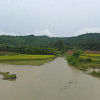Cars are killing Earth, in more ways than we think

I was once in a gym in the US when I noticed an ad on TV. It was by a car company and talked about how many trees are disappearing due to… well, I don't quite remember which catastrophe they acknowledged as destroying trees. Would they dare mention the climate crisis, given how much cars contribute to it? In any case, the ad involved drawings by children and happy talk about the 100,000 trees that the car producer was donating to be planted to help replace all the trees being cut down or destroyed.
But those one lakh trees… planted where? Tended by whom? And how to protect those trees from droughts, flooding, fires, and other climate-related tree-destroying chaos? While this is simply yet another example of corporate greenwashing, it felt particularly egregious given the involvement of children. (To get them started early, thinking that cars are good for the environment!)
Think about it: should we need a reminder that the Earth is vital and we are doing a lousy job as its custodians? But when was the last time you walked on an unpaved forest path or a quiet beach? For those of us living in cities, it is hard to stay connected with the planet and remember that it sustains us. Even in rural areas, we experience less of nature and more of agriculture, the deliberate cultivation of the Earth in a way that is not natural.
And—allow me to gripe for a moment—how many Earth Day celebrations, events, social media campaigns, and newspaper articles discuss one of the most harmful products on the planet, environmentally speaking: the automobile? Cars are harmful to our health and to our environment in many ways that most people are not aware of; too often, we just assume that buying a new, "less polluting" car is the solution.
In fact, all cars pollute, and in some ways, electric cars can pollute more than regular ones. Cars—their manufacture, use, and disposal—release all kinds of pollutants into the air, soil, and water. Cars are a major contributor to climate change. All the space and money we devote to cars also means that we have that much less available to green our cities and to ensure that water bodies exist to help prevent flooding.
All the infrastructure we build for cars, and those heavy vehicles travelling at high speeds, kill wildlife as well as people and contribute to the loss of biodiversity. Highways fragment and destroy wildlife habitat. Car use contributes to more frequent and more severe natural disasters, which in turn destroy all those trees that the above-mentioned automobile manufacturer and other companies brag about planting.
We know that car emissions cause pollution. Fewer people are aware that cars also pollute due to the friction of tires on roads and the use of brakes. Car use also releases harmful microplastics into the air.
Then there's lead, which has been connected with several health and behavioural issues. These days, about 75 percent of global consumption of lead is for car batteries. Lead is also found in the paint on cars and road markings, and continues to leach into our environment, harming and killing us.
Oil from cars also enters our soils and is carried into our water bodies, contributing to water and other pollution.
Most urban noise pollution is from cars and motorbikes. While we strive to convince people to honk less (or not at all) in Bangladeshi cities, there is also the noise from the engines, particularly in the case of motorbikes. Noise pollution is an aggravation; it also kills.
The batteries used in electric cars require an enormous amount of resources that need to be mined; disposal of batteries is harmful to the environment; and the heavier weight of electric cars means more friction and more chemicals released when they are driven.
It's time to shift the focus on the terrible destruction caused by cars. And it is past time to change the focus of our transport system from catering to the car-using minority to serving all those who lead their lives and move about without causing such devastating harm to our Earth.
Debra Efroymson is executive director of the Institute of Wellbeing, Bangladesh.
Views expressed in this article are the author's own.
Follow The Daily Star Opinion on Facebook for the latest opinions, commentaries, and analyses by experts and professionals. To contribute your article or letter to The Daily Star Opinion, see our submission guidelines.

 For all latest news, follow The Daily Star's Google News channel.
For all latest news, follow The Daily Star's Google News channel. 










Comments